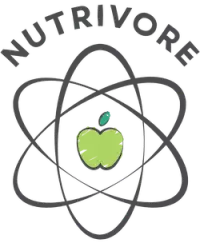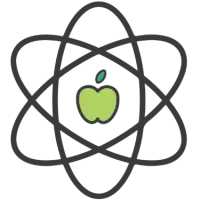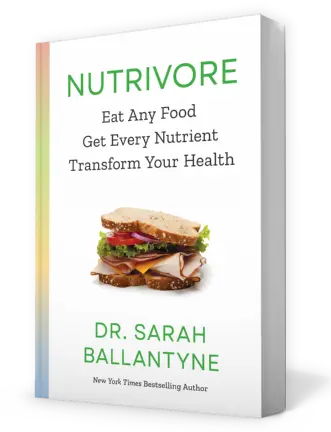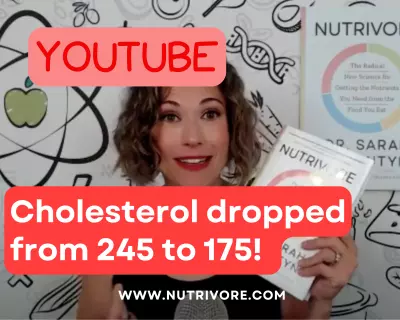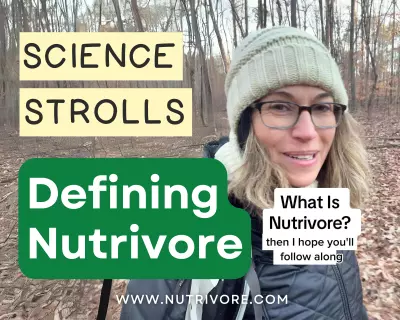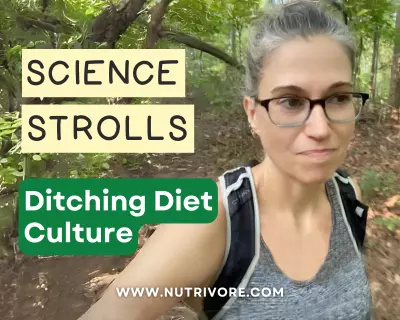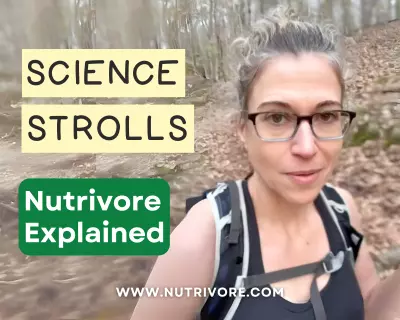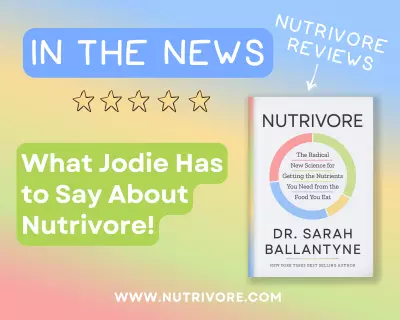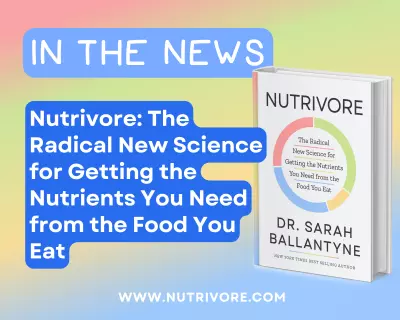Is Nutrivore a Big D Diet or a Little D diet?
Producer Potts 0:19
Nutrivore is simply the goal of getting all the nutrients we need from the foods we eat. That is the beginning, middle and end of what a new tuber is, I know this phrase. So well. Thanks to listening to you on so many podcasts recently, which, if you haven’t checked out Sarah’s playlist here on YouTube, it’s Dr. Sarah meter. She’s been on a bunch of podcasts, they’re all interesting and different. Go check it out, because they’re really good. But I want to dive into that statement a little bit deeper with a three part question, if you’ll indulge me on that. Yeah, of course. Okay, so let’s start with this. So big D diet and little D diet is another phrase I’ve heard you use very often. Can you give us a super quick explainer on diet and diets? Yeah.
Dr. Sarah 1:05
So a little D diet is the word that explains how we eat on a regular basis, right? It explains all the different types of things we eat. The eating patterns are kind of the other way to think of it right. So a little D diet is like, what types of foods do you eat? What What? What is your nutritional status? Right? What, like, are you getting those important foods that support long term health? Big D diet, right? Is the name right? It’s the proper noun. A big D diet is vegetarian, vegan, Mediterranean, paleo, gluten free, keto carnivore, like it is, it is the thing with a name South Beach, Atkins, it is the thing with a name that you are sold. Right? So maybe there’s a community around it. So it doesn’t seem like some of these big diets have a central organizing body; they have some somebody or group of somebody, who are in charge of defining what that diet is. And they’re the ones creating resources like diet books, cookbooks, you know, webpages, recipes, whatever. Like they’re, they’re the ones in charge of creating things for you. And then some right like vegan is a very good example of this has a community around it that kind of like it’s more grassroots, right? So there’s a lot of different people who can talk about what that diet looks like, and a lot of different people who can say whether or not a specific food, like a vegan diet, is a standard or not right. So some of these diets sort of have an organizing body and some of them don’t. And some of them have, like factions within the diet, right. So like the group, right, like within, within paleo there, there’s the group that eats grass fed dairy, and the group that doesn’t, right, so like some of them also have like little groups within them. But what all of those have in common is a big D diet, if they have rules. They have foods that you eat, and foods that you do not eat. Whereas a little the diet, it is more about like you as an individual and kind of describing what types of like, how you eat on a regular day foods that make up your day are.
Dr. Sarah 3:38
And when we’re looking at understanding how eating patterns influence long term health, we’re looking at the science that’s looking at a little D diet, not a big D diet. So we’re looking at, I mean, yes, there’s some interesting things like Mediterranean diet, Nordic diet, like there are some really interesting Big D diets that have a lot of science to support them. And basically, Mediterranean Nordic, basic, I mean, really, those are the ones that have those are the eating patterns that improve long term health. And that isn’t, most big D diets are about weight loss, right? Whereas a little D diet, again, if we’re thinking about eating patterns, we’re thinking about long term health, and that may or may not be compatible with local law schools. That’s a whole separate conversation. So when I talk about literally dieting, I’m talking about eating patterns, and thinking about how those impact health over the long term. Whereas to me, like a big diet is diet culture, and the rules and the restrictions that go along with that with a couple of exceptions. Right, the Mediterranean is much more about what you eat, not what you don’t, there are few big D diets that act more like little D diets, but most of them I mean, most big D diets or fad diets like most don’t actually have a body of scientific literature. or supporting the claims. And most of them work for weight loss for a little while and then stop. And then you go on the next more restrictive thing, right like and that’s how they keep selling you the next thing. So most big diets are the toxic diet mentality that goes along with shame and guilt and restrictive diet patterns that lead to disinhibition and falling off the diet wagon and the yo, yo. So yeah, I don’t have a lot of things to say about most big D diets.
Producer Potts 5:33
Alright, so here’s my second question to my three part question. Sure. So from what I know about neutral four, because I’ve been learning from you, I know that Nutrivore is about overall eating patterns. So Nutrivore is a little D diet, even though it does have a founding body, and you have a book and all this stuff. So from someone on the outside looking in, it would be really easy to just assume with a quick glance that Nutrivore is a big, big D diet, like that would be a fair assumption. So can you tell us what makes neutral for different or does Nutrivore kind of fit in the Mediterranean diet? Is it? Is it a little diet and a big D diet? But just different? Or like how would you explain that for the person who’s just like making that quick assumption?
Dr. Sarah 6:25
Yeah. You know, that’s the thing about judging a book by its cover, although this book has such a beautiful cover, you could absolutely judge it, and you’d be judging it accurately. But I think, to be serious about this question, I think that, yes, it would be very easy to look at the content that I create on social media, and the messages that I’m trying to put out there and go YouTubers, just another fad diet.
Dr. Sarah 7:04
Your observation that it kind of fits in both worlds in the same way that a Mediterranean or Nordic diet fits in both worlds, you can very much see all of the science supporting Mediterranean eating patterns reflected in the educational resources that I create for nuclear war, because its nuclear war is just about understanding the conclusions and consensus that we have in Nutritional Sciences. That’s that’s all it is. I’m just communicating where Nutritional Sciences is at right now. And what the actual evidence is for beneficial long term eating patterns, and then busting a lot of myths that big diets teach us so that we can be open and receptive to some information that may contradict some of the messages from big diets. But I think the, the, the way I think about nutrastore is more living like in between diet and anti diet. So if you like the Big D diet, and anti Big D diet, right, so when I think about diet, big D diet, that’s rules and food lists and restriction and guilt and blame, and the yo yo roller coaster of doom. Whereas anti died is like fighting against all of that dogma and restriction and the part where the like the natural, like human behavior is on again off again, because restriction is not sustainable. So anti dieting is sort of fighting against diet mentality. And I feel like, like Nutrivore is right in between maybe leaning more towards anti diet philosophically, where no food is off the table, and we don’t engage in moral judgments of foods. There’s no one food you have to eat and one food you have to avoid. And we’re much more about just understanding again, like nutritional sciences, like what are the long term eating patterns that support health? And how can we adopt those in such a way where we’re not on that yo yo, roller coaster of diet Doom, I could see how like, from the outside in it would look like, oh, another fad diet, but I don’t think you need to scratch the surface very deeply. Like you don’t need to get into it too deep before you see just how different YouTuber is from any big D diet. Again, other than Mediterranean or Nordic, because those are much more about eating patterns as well.
Producer Potts 9:43
So basically Nutrivore while having some elements of a big D diet at its core. is a little D diet and it really can be a soft place to land in between these two, diet and anti diet. codon movements. Okay, so here’s my third part of the question and it’ll probably be really short, but like, I think we did a grammar lesson. So would I say I am a Nutrivore? Or would I say I eat a Nutrivore diet? So like is neutral or noun or an adjective? And just also to preface that, like, is there an issue with like, looping your identity and with a diet and how would you like people to identify with neutral vor from your perspective?
Dr. Sarah 10:42
Oh, I think there’s like a really easy question to answer. And then actually a really like, hard question to answer. Okay. So I use the word Nutrivore Okay, so it’s a play on words, I think it’s clever. But the idea of right carnivore eats meat, herbivore eats plants, a Nutrivore eats nutrients, right, like it’s just a play on words. So it is just a diet focused on nutrients is kind of like how I think of it definitionally. And I suppose you would say, herbivorous, so you could say, neutral, Boris, but I just do, that’s too much. That’s too many, too much. So I just use Nutrivore as either a noun or an adjective. So I would say I am a Nutrivore, or I eat a nutritious diet. And when you think of Nutrivore as that overarching philosophy of just getting all of the nutrients our bodies need from the foods we eat, you get a little D diet, a little D diet, right? Okay. So think of it as an emphasis that you can apply a top of a big D diet. So you could be a Nutrivore vegetarian, right? Oh, you would use Nutrivore as a diet modifier or as an adjective to describe an extra emphasis on nutrients applied to another dietary template. So there’s this other grammatical way to use it. Not just I eat a Nutrivore diet, but like, I am a Nutrivore pescatarian, right. Like, I have this emphasis on nutrients on top of maybe I have some other reasons for following this other diet. Maybe my doctor has suggested that I be a pescatarian. Maybe I have religious reasons for eating that particular diet, right? So you can still apply that Nutrivore diet to the top of a big D diet. If you wish, like it there’s the default mode is little D diet. But that doesn’t mean you can’t combine the Nutrivore philosophies.
Dr. Sarah 12:55
Do I want people to say I’m a Nutrivore? Okay, so, like, the branding person in me is like, Yeah, I do. Yeah, I want people to say I’m a Nutrivore or I eat a Nutrivore diet. Yes. I want people to know what this word means. Like, yes. I think that the reason why, like, just to kind of talk, like from a branding perspective, is the reason why in my rebrand, I chose a word right? To describe, as I’ve already said, right? The resource I’m creating is just reflecting scientific consensus in Nutritional Sciences on the topics where there’s enough data to have scientific consensus, right? I’m just a science communicator in nutrition right now, right, but the word is there, because we tend to diet culture has taught us to have an identity that is partially wrapped up with how we eat and that is more common than the alternative right? It is more common for someone to have a Big D diet with a name that they identify with and identify themselves. Part of their own identity that they take on is associated with I am a vegan right? I like or I am a carnivore it is per I am anti diet, or I am anti diet or right I do Intuitive Eating intuitive eating. Yeah, we do tend to incorporate these kinds of big parts of our lives and what we eat is a big part of our life into our own sense of self. So I love people to incorporate Nutrivore into their own sense of self. Yes, if you like, I think that since we’re kind of going to do that anyways, that’s a great idea. And that’s why I’m not just Dr. Sarah Ballantine’s nutritional sciences.com Right? That’s why It’s Nutrivore.com. That’s why the book is called Nutrivore right? It gives us a name because we were going to do that anyways. And so yes, I love the idea from a branding perspective, the more people saying the word Nutrivore, the more, the more people go, Oh, what’s that? The more conversation starters there are the more people start to engage with this knowledge base of understanding nutrition.
Dr. Sarah 15:26
We don’t learn that in school. Right, right. Not in a way that actually helps to inform our day to day food choices. So yes, from a branding perspective. Yeah, I mean, that’s why this is the new tourism brand, because we already kind of like, like, make our diets our entire personalities, like that is already a thing we do. But from a psychology perspective, I think it would be better if we didn’t make our diets our entire personalities. Right, right. Yeah, right, it had eating patterns, it’s kind of just the way I eat. And we didn’t have to put a whole lot of thought into it, we just kind of have our healthy habits. And we don’t put a lot of likes, we like when we put moral judgments of foods, like when we tell say guy that food is good, or that food is bad, we take on those moral judgments when we eat that food. So if I eat bad food, I’m a bad person. And if I have bad health, I must have bad health because I ate that bad food. And I’m a bad person, right? Like, that propels health ism. And so I think that, you know, in an ideal world, we would be able to transcend diet labels, we would just understand what healthy eating nutrient dense eating patterns are, I would not be the only person talking about what those are. And I wouldn’t be the only Nutrivore, creator out there. And in an ideal world Nutrivore would actually be a stepping stone towards ending diet labels, and Big D diets and fad diets. And it just becomes like, I understand the value of nutrients and what foods to eat to get those nutrients and what the big eating patterns are, that meet my nutritional needs. Like, in an ideal world, Nutrivore would actually get us to a point where like, nobody is using the word right, like, first. First, we need everyone to use the word. And then we can just leave the word behind.
Producer Potts 17:21
Right? I got that. I got that. Cuz like, in the long term, your goal is educating people on what nutrients do in the body and what foods contain them, it’s just so they can make better choices for themselves. And in the long term, it doesn’t really matter what they call it as long as that goal is being achieved. Because that’s like the passion behind your work. Right. Like, that’s why you do what you do
Dr. Sarah 17:47
I mean, the difference that could make in public health, like, would it cure everything for everyone? No, because food just isn’t that important in the overall health equation, like food plus lifestyle is 40 to 50% of health outcomes. So would everyone adopting a sustainable nutrient dense diet, fix everything that goes wrong with us health wise, like know that no diet can do that? That’s impossible. But 40 to 50% of health outcomes, because it’s huge. If you reduced cardiovascular disease by 40 to 50%, type two diabetes by 40 to 50%, cancer by 40 to 50%, Alzheimer’s disease, osteoporosis, like the the, the how that would completely change everything, like not just the individual who gets to benefit from that improved long term health, like, yes, it’s transformative for that one person, but just think about the how that would change, like society, how that would change healthcare, how that would a chain change the economy, like, it would just be. I mean, it’d be a whole new world if we had this burden of disease. And that is, like, again, we can’t get rid of it completely. But we could dramatically reduce it with YouTube or being widely adopted. And do I care if we achieve that goal? And everyone’s using the term Nutrivore or no one knows the term Nutrivore? Do I care if, if people have heard of me in this scenario versus not like, No, I just want like, I want this amazing thing to be achieved where we dramatically improve public health, through nutritional sciences education. So I think the word Nutrivore is a great stepping stone to us getting there. But is it the only path? No, but that is the path that I know how to pave.
